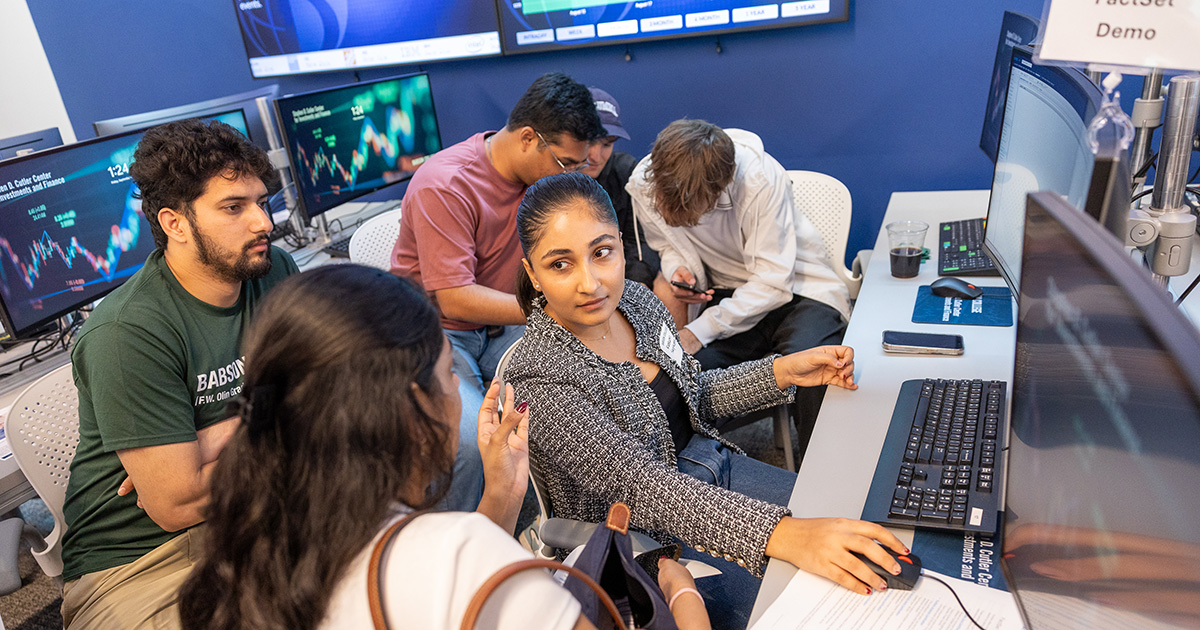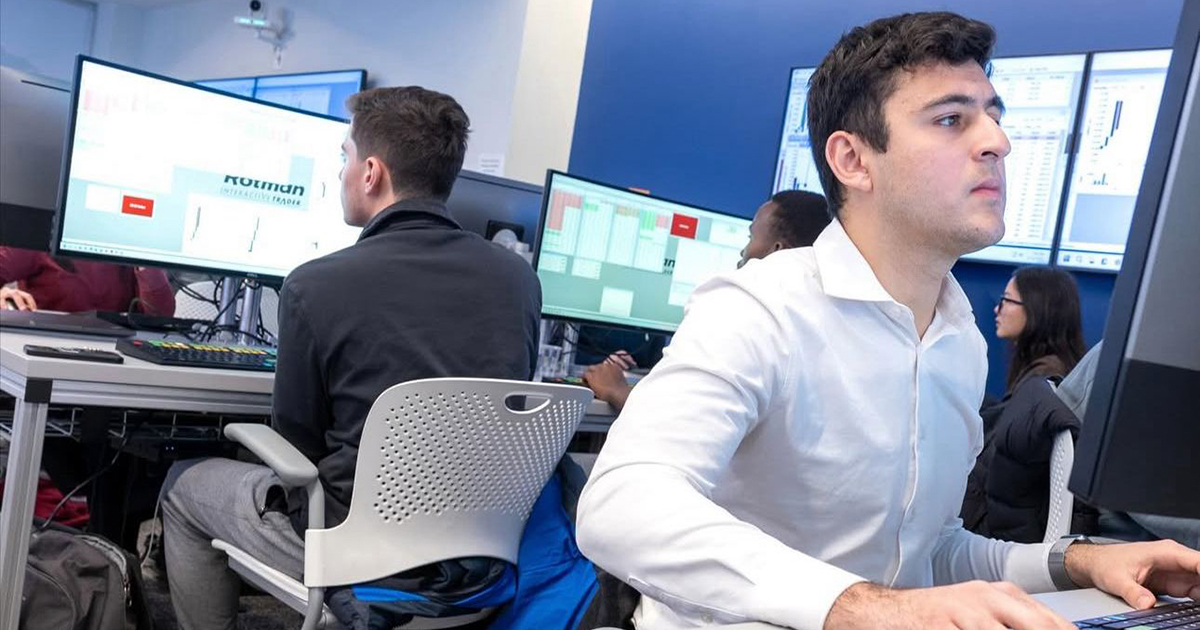Competition Provides Hands-On Approach to Finance

At Babson, entrepreneurial leadership and experiential learning go hand in hand with finance and monetary policy. Wait, what?
In fact, Babson’s largest alumni population works in finance. And, Babson has plenty of opportunities for students to put into practice what they learn in the classroom.
The Fed Challenge: Policy Leadership through Collaboration
Each year, Assistant Professor Josh Staveley-O’Carroll teaches a course called The Fed Challenge.
Staveley-O’Carroll, who also teaches Entrepreneurial Economics for the Master of Science in Management in Entrepreneurial Leadership (MSEL) program among other courses, guides his students as they research economic topics and make policy-related presentations.
The course culminates with the College Fed Challenge, a competition in which teams analyze economic and financial conditions and present monetary policy recommendations to professional economists who judge the competition. It’s a real-world pressure cooker.
“Students present to PhD economists from other colleges, and in the final round, they present to actual professional economists at the Boston Fed,” Staveley-O’Carroll said.
This year, the Babson team—which recently advanced to the semifinals of the College Fed Challenge—looked at a specific section of the CARES Act, which provided economic assistance to workers, families, and small businesses affected by the pandemic.
“We specifically focus on the Main Street Lending Program that is targeted at medium-sized firms,” he said.
The team found that one section of the CARES Act was being underutilized, which had an outsized effect on minority populations. The team’s solution? Aim the lending program to specific groups of people. The team’s main policy recommendation was to raise the fees that banks get from the Fed to incentivize them to lend in those specific areas, which, in turn, would open up access to loans.
Entrepreneurial Leadership on Display in Stock Picking Competition
The Fed Challenge isn’t the only competition that hones students’ skills.
Babson’s annual Stock Picking Competition, hosted by the Stephen D. Cutler Center for Investments and Finance, brings together students and alumni who go head to head investing fictitious money based on the current market to vie for real cash prizes. This year’s competition had additional challenges, with the backdrop of a global pandemic.
James Cheng ‘20, earned the top prize, and put himself in the best position to succeed by allocating a few hours each week for research.
“Even in a downturn or recession,” he said, “not all stocks are losers—there’s always some winners.”
To learn more about experiential learning at Babson, check out the ongoing series about the journey of first-year students through the Foundations of Management and Entrepreneurial Leadership (FME) course.
Patrick Gregory, senior lecturer and managing director of the Cutler Center, said the competition offered a chance to engage students outside the classroom. The volatile market made the experience that much more valuable.
“It forced the students to consider the impact that COVID-19—and the measures taken to contain it—would have on industries and companies they were considering for investment,” he said.
Cheng’s winning stocks were Papa John’s International, Advanced Micro Devices, and Direxion Daily Gold Miners. “Pizza is recession-proof. … (And) gold is king in this kind of environment,” he said.
“Babson offers a lot of great experiences,” Cheng said, mentioning the Babson College Fund and Babson Trading Competition, where some winners go on to the Babson Trading Team. “That creates a great environment for learning.”
A Finance Venture with Babson Roots
True to Babson’s DNA, when something doesn’t exist, students create it.
Sumukh Setty ’21 is a former president of eTower—a specialty-housing community that brings together student entrepreneurs to live, share ideas, and create.
For Setty, a simple conversation he had with a professional mentor led to the possibility of starting an investment fund for student entrepreneurs. That simple conversation ultimately led to the creation of Green Line Ventures—a fund that provides ventures with investments from $10,000 to $25,000.
“I do want to be an entrepreneur in the future, and I believe I will become a better entrepreneur by helping other entrepreneurs now.
Sumukh Setty ’21
“For a company starting out, we think that is a good amount of money to get them to the next stage,” Setty said. “We can really accelerate a company with this capital.”
While Green Line Ventures has roots at Babson, it also supports student ventures from Wellesley College and Olin College of Engineering. “We are so blessed to be in proximity to them,” Setty said. “Their students are super smart. They add a unique perspective.”
Though Setty is focused on student ventures, he also thinks of others. “I like to help founders where I can, and get them from A to B,” Setty said. “I do want to be an entrepreneur in the future, and I believe I will become a better entrepreneur by helping other entrepreneurs now. It helps me to understand what it takes to launch and scale a business.”
Posted in Community



